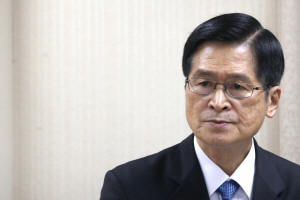China threatens retaliation over new U.S. arms sales to Taiwan
 Send a link to a friend
Send a link to a friend
 [October 22, 2020]
By Gabriel Crossley and Ben Blanchard [October 22, 2020]
By Gabriel Crossley and Ben Blanchard
BEIJING/TAIPEI (Reuters) - China threatened
on Thursday to retaliate against the latest U.S. arms sale to
Chinese-claimed Taiwan, as the island welcomed the weapons package but
said it was not looking to get into an arms race with Beijing.
The Trump administration has ramped up support for Taiwan through arms
sales and visits by senior U.S officials, adding to tensions between
Beijing and Washington, already heightened by disagreements over the
South China Sea, Hong Kong, human rights and trade.
Beijing has applied increasing pressure on democratically-ruled Taiwan
to accept China's sovereignty, including by flying fighter jets across
the sensitive mid-line of the Taiwan Strait, which normally serves as an
unofficial buffer.
Responding the U.S. approval of a potential $1.8 billion arms sale to
Taiwan, China's Foreign Ministry spokesman Zhao Lijian said during a
daily news briefing that such sales should stop.

The sales "seriously interfere with China's internal affairs, seriously
damage China's sovereignty and security interests, send a seriously
wrong signal to Taiwan independence forces, and severely damage China-U.S.
relations and peace and stability in the Taiwan Strait," he said.
"China will make a legitimate and necessary response according to how
the situation develops," Zhao added.
He did not give details, but China has sanctioned U.S. companies in the
past for selling weapons to Taiwan, though it is unclear what form they
have taken.
The latest U.S. arms package includes sensors, missiles and artillery,
and further congressional notifications are expected for drones made by
General Atomics and land-based Harpoon anti-ship missiles, made by
Boeing Co, to serve as coastal defence cruise missiles.
In Taipei, Taiwan Defence Minister Yen De-fa thanked the United States
and said the weapons were to help Taiwan improve their defensive
capabilities to deal with the "enemy threat and new situation".
"This includes a credible combat capability and asymmetric warfare
capabilities to strengthen our determination to defend ourselves," he
added.
[to top of second column]
|

Taiwan's Defence Minister Yen De-fa answers questions asked by
lawmakers in parliament in Taipei, Taiwan, October 22, 2020.
REUTERS/Ann Wang

"This shows the importance attached by the United States to security
in the Indo Pacific and Taiwan Strait. We will continue to
consolidate our security partnership with the United States."
Yen said they were not looking for confrontation.
"We will not engage in an arms race with the Chinese Communists. We
will put forward requirements and build fully in accordance with the
strategic concept of heavy deterrence, defending our position and
defensive needs."
Taiwan's armed forces are dwarfed by China's, which are expanding
their capability with impressive new weapons like aircraft carriers
and stealth fighters.
Taiwan President Tsai Ing-wen has made defence modernisation a
priority in the face of a rising Chinese threat, particularly
"asymmetric warfare" capabilities, which refers to making any attack
Chinese attack difficult and costly, for example with smart mines
and portable missiles.
Washington, which, like most countries, has no formal diplomatic
ties with Taipei though it is its strongest global backer, has been
pushing Taiwan to modernise its military so it can become a
"porcupine", hard for China to attack.
Taiwan has been testing new surface-to-surface missiles which its
media says have the ability to strike deep inside China, potentially
giving the island the ability to attack far off Chinese air bases
and command centres.
(Reporting by Gabriel Crossley and Ben Blanchard; Editing by Simon
Cameron-Moore)
[© 2020 Thomson Reuters. All rights
reserved.] Copyright 2020 Reuters. All rights reserved. This material may not be published,
broadcast, rewritten or redistributed.
Thompson Reuters is solely responsible for this content.
 |